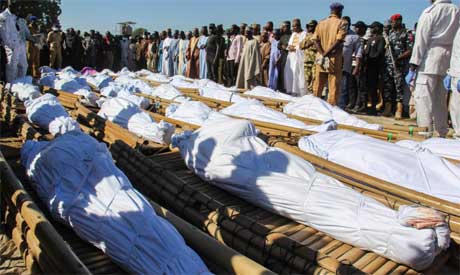
TOPSHOT - Mourners attend the funeral of 43 farm workers in Zabarmari, about 20km from Maiduguri, Nigeria, on November 29, 2020 after they were killed by Boko Haram fighters in rice fields near the village of Koshobe on November 28, 2020. - The assailants tied up the agricultural workers and slit their throats in the village of Koshobe. The victims were labourers from Sokoto state in northwest Nigeria, roughly 1,000 kilometres (600 miles) away, who had travelled to the northeast to find work. AFP
Villagers in northeast Nigeria's Borno state on Sunday buried 43 farmers killed in an attack by suspected Islamist militants while security forces searched for dozens of people who are still missing.
Roughly 30 of the men killed were also beheaded in the attack, which began on Saturday morning in Zabarmari village in northeast Borno state. Residents said a total of 70 people are feared dead.
While no group claimed responsibility, such massacres have been carried out in the past by Boko Haram or the Islamic State West Africa Province (ISWAP). They are both active in the region, where Islamic militants have killed at least 30,000 people in the past decade.
President Muhammadu Buhari condemned the killings and said "the entire country is hurt."
In Zabarmari, dozens of mourners surrounded the bodies, which were wrapped in white burial shrouds and placed on wooden pallets, as clerics led prayers for the deceased.
One resident and Amnesty International said 10 women were among those missing.
Borno state governor Babagana Zulum, speaking at the burials, called on the federal government to recruit more soldiers, Civilian Joint Task Force members and civil defence fighters to protect farmers in the region.
He described desperate choices facing people.
"In one side, they stay at home they may be killed by hunger and starvation, on the other, they go out to their farmlands and risk getting killed by the insurgents," he said.
Food prices in Nigeria have risen dramatically over the past year, driven by flooding, border closures and insecurity in some food-producing areas.
Short link: